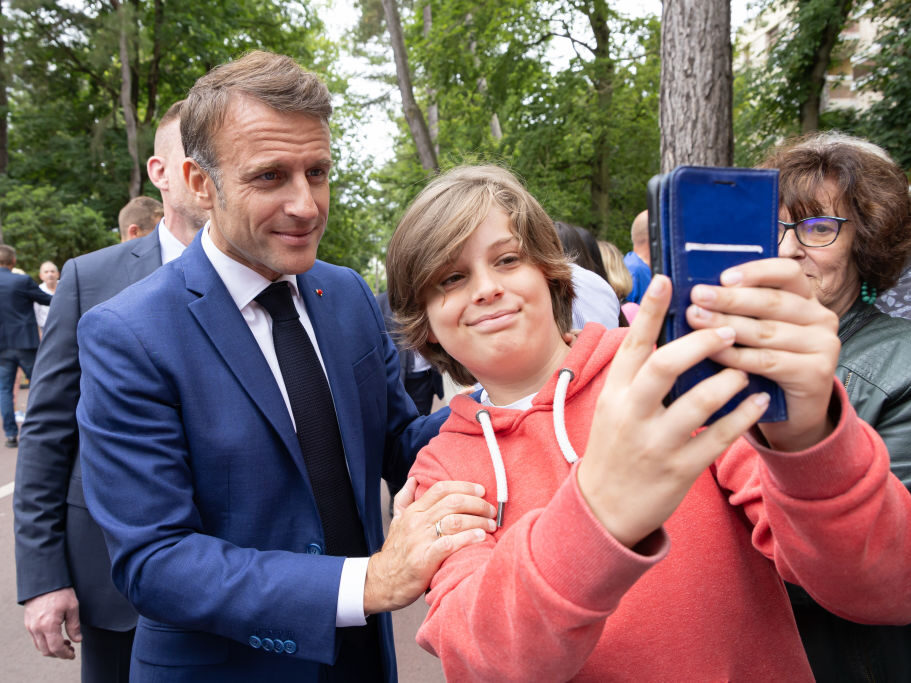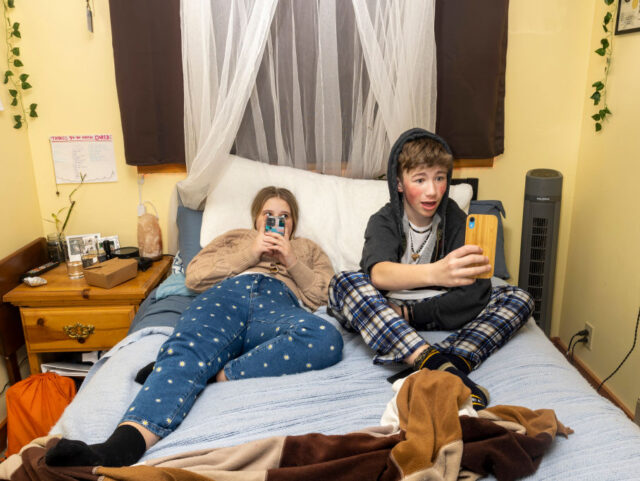Australian politicians describe their ban on children under 16 using social media as “world-leading,” but in truth, the rest of the world is not far behind them.
An international consensus against permitting children on social media gained momentum in 2024, despite deep reservations from Internet freedom advocates.
Australia’s ban, which passed the House of Representatives on Wednesday, is the most severe proposal currently making their way through legislatures across the globe. Australia would ban children under 16 from using most social media platforms, with no “grandfather” clause for young people who have existing accounts on the day the law takes effect. Companies will be fined up to $33 million for failing to enforce the ban.
The unanimity behind Australia’s bill is remarkable. It passed the House of Representatives on a vote of 102 to 13, and will probably pass Australia’s Senate with strong support later this week. There is almost no serious political opposition to the ban – if anything, some opposition politicians think the ban should be even tougher.
“We know social media is doing social harm. We want Australian children to have a childhood, and we want parents to know the government is in their corner,” Prime Minister Antony Albanese said when pushing the bill last week.
One of the few outspoken critics of the bill, Independent MP Zoe Daniel, argued on Wednesday that the ban would “make zero difference to the harms that are inherent to social media.”
“The true object of this legislation is not to make social media safe by design, but to make parents and voters feel like the government is doing something about it,” Daniels argued.
“There is a reason why the government parades this legislation as world-leading, that’s because no other country wants to do it,” she said.
It might be more accurate to say that many other countries want to do it, but they are much more daunted by the problems with a social media ban than Australia is. Those problems range from technical issues with implementation, to free speech and human rights issues, to arguments that banning social media will ultimately hurt children more than it helps them.
Australia has evidently decided to push the bill through in a mad dash and work out the kinks later, and if they do manage to make it work, some other legislatures may overcome their reticence to follow their example.
The United States, which nominally enjoys the world’s strongest free speech protections, is entertaining a bill called the Kids Off Social Media Act that would impose similar, but less severe, restrictions than Australia. Among the key differences is that the U.S. bill has a cutoff age of 13, rather than Australia’s 16.
The Kids Off Social Media Act enjoys bipartisan support, having been introduced in the Senate by Democrats Brian Schatz of Hawaii and Chris Murphy of Connecticut, plus Republicans Ted Cruz of Texas and Katie Britt of Alabama. Cruz’s conservative bona fides make his support especially noteworthy, given the First Amendment concerns surrounding a social media ban.
Schatz noted that the bill has overwhelming support from parents in most polls, including 90 percent support in a survey conducted by Count on Mothers, an advocacy group that says it has never polled higher support for any legislation.
The bill’s authors noted that most social media platforms nominally require users to be at least 13 years old, so the bill would simply require them to enforce a restriction they have largely ignored.
As in Australia, the U.S. legislation would also place restrictions on social media companies using algorithms to push content to people under 17. Social media critics say these algorithms tend to push toxic content to young users.
The United Kingdom has been considering a social media ban for children under 16, although Secretary of State for Science, Innovation, and Technology Peter Kyle said last week that legislation is “not on the cards at the moment” – provided companies do more to enforce their own stated policies for the protection of young users.
Kyle had previously stated a ban was “on the table” and suggested it might find its way back to the table if companies don’t do enough voluntarily. He said he would be closely monitoring the implementation of Australia’s bill.
Kyle said that while most parents he spoke to did not favor an outright ban on social media for teens, some were desperate for help with navigating the treacherous online landscape.
“I’ve met parents of children who have either committed suicide or the murder has been instigated via online activity. I get a lot of parents writing to me saying ‘just stop this kit getting into my kid’s hands,’” he said.
France passed a bill in 2023 that bans children under 15 from social media unless they receive express permission from their parents. Australia will have no such provision for parental consent.)
French President Emmanuel Macron said in April he would like to see the entire European Union (EU) adopt the French approach, establishing 15 as the age of “digital majority.”
“Does anyone send their child into the jungle at 5, 10 or 12? Today, for several hours a day, we open the door to the jungle,” Macron argued.

French President Emmanuel Macron poses for a selfie with a member of the public before leaving a voting station on June 30, 2024 in Le Touquet-Paris-Plage, France. (Sébastien Courdji/Getty Images)
The EU currently has regulations that require parental consent before companies can process personal data on children aged 16 or younger, and it allows member nations to lower this age to 13 if they desire. This would theoretically mean France’s system is already in place, since social media access almost inevitably requires processing personal data, but the EU restrictions are very loosely enforced.
Norway’s 2018 Personal Data Act established a minimum age of 13 for using social media, similar to the restrictions envisioned by the U.S. Kids Off Social Media Act. The Norwegian government said in October it plans to raise the minimum age to 15.
Minister for Children and Family Affairs Kjersti Toppe said in October that peer pressure among children makes it virtually impossible for parents to police social media usage, so the government must step in with universal restrictions.
“Half of today’s 9-year-olds are on social media, and I share the concern that this can be harmful to children. We know that many parents find it difficult to avoid their children being on social media when so many other children are,” Toppe said.
“Parents cannot stand alone in the face of the technology giants. That is why we are considering stricter legislation,” she said.
“These are big tech giants pitted against small children’s brains. We know that this is an uphill battle, because there are strong forces here, but it is also where politics is needed,” argued Norwegian Prime Minister Jonas Gahr.
Toppe said Norway planned to promote its updated restrictions to the EU as a model that could be emulated across Europe. Danish Prime Minister Mette Frederiksen welcomed that suggestion in May, arguing that EU-wide government action is necessary because “tech giants don’t take responsibility” for what happens to young users.
In July, European Commission President Ursula von der Leyen called for an inquiry into cyberbullying, online child abuse, and damage to children’s mental health from social media.
“My heart bleeds when I read about young people harming themselves or even taking their lives because of online abuse,” von der Leyen said.
The free world is wrestling with some big questions about Internet freedom, but the unfree world has no such qualms. Authoritarian China ordered app developers last year to implement strict rules for young people on the Internet, such as a daily limit of 40 minutes of screen time for children under eight, bans on all content for children that is not considered “educational” in nature, and an overnight “curfew” on Internet access.

A child conducts an experiment with VR headset and hand controllers at a booth of NetDragon Websoft Inc. in the on-site experience area for the 7th Digital China Summit on May 26, 2024 in Fuzhou, Fujian Province of China. (Wang Wangwang/VCG via Getty Images)
Australian Strategic Policy Institute (ASPI) analyst Fergus Ryan ruefully pointed out in September that China gleefully exports some of the most harmful content to Western young people, using platforms like TikTok, while simultaneously shielding its own children from those harmful influences. As former U.S. congressman Mike Gallagher said, Beijing has decided that “China’s children get spinach, and America’s children get digital fentanyl.”
Ryan nevertheless found a useful element of China’s approach was its focus on including application developers and other “stakeholders,” rather than placing the entire burden on social media platforms. In Australia, America, and Europe, social media companies have argued that children can find too many workarounds for any restrictions they might impose.
“While the Chinese Communist Party can influence TikTok’s algorithm, they’re not force-feeding us digital fentanyl; the real issue is our own failure to implement safeguards that ensure a healthier digital experience for our kids,” Ryan argued.
The legal and technical hurdles to banning social media for children are formidable, but perhaps not insurmountable, as Australia seems dead-set on demonstrating. Other criticisms of the approach are not so easily overcome, such as children’s advocates fearing that a social media ban would deprive them of healthy online social interaction and interfere with their access to useful information.
These effects would be especially traumatic for children who were active online when a ban like Australia’s goes into effect, abruptly severing them from online friends and communities they have been communicating with for much of their young lives.
Critics worry that children resorting to guerrilla tactics to access forbidden social media platforms will be even more vulnerable to exploitation than before, and they will be more reluctant to report abuse when they encounter it.
Social media platforms X, TikTok, Facebook, and Instagram criticized the “vague” and possibly unworkable provisions in the Australian bill, and echoed Ryan’s point that other “stakeholders” were not involved enough in the process, putting the full burden of compliance – and full punishments for non-compliance – unfairly on the shoulders of social media providers.
The tech companies noted that even Australia’s super-strict ban has arbitrary carve-outs for platforms like YouTube that were deemed essential to children’s education, and for video game platforms with heavy social media elements such as Roblox and Minecraft – which can be among the most hazardous online environments of all for children.
Elon Musk, who now owns the social media site Twitter, suggested last Thursday that Australia’s bill “seems like a backdoor way to control access to the Internet by all Australians.” The government website for feedback on the law was slammed with a tidal wave of over 15,000 submissions in less than 24 hours after Musk spoke up.
The movement to ban social media for children could also run into heavy opposition from the Left, particularly from LGBT groups, which are concerned that even requiring parental consent for minors prevents LGBT youth from making contact with “identity-affirming communities” online.
“Everything seems to be trying to make the world smaller. The internet, in some ways, remains the place where the world is still large, and where folks can discover new things about themselves, new things about the world around them,” lamented Casey Pick, director of a nonprofit suicide prevention group for LGBT youth called the Trevor Project.

COMMENTS
Please let us know if you're having issues with commenting.